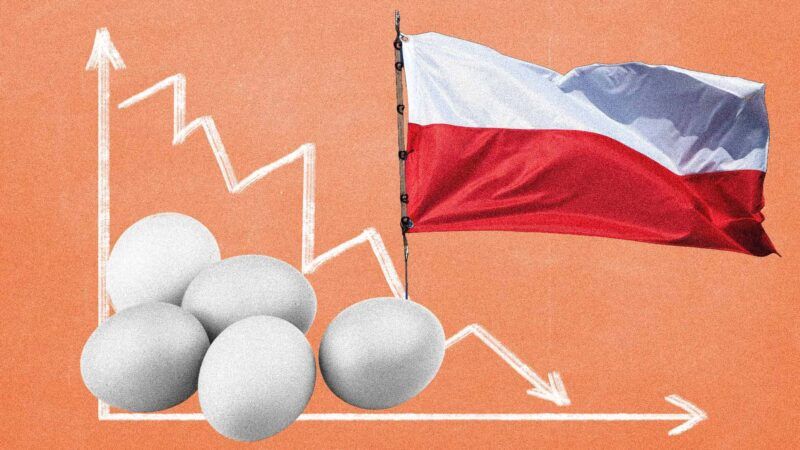How Egg Prices Became the Symbol of Poland's Successful Transition to Freedom
In the chaotic early days of Poland's "shock therapy," free market reformers measured their success by the falling price of this one basic commodity.

This Easter, we've hidden a dozen colorful, egg-centric stories across Reason.com. Hop around the site to find them—or click here to see them all in one basket.
The fall of the Berlin Wall in November 1989 was the dramatic event that marked the fall of European communism. The first sign that freedom was actually working in the former Soviet Bloc would prove to be a little more mundane: the falling price of Polish Eggs.
By the 1980s, Poland's command economy was in deep crisis. Budget deficits and inflation were skyrocketing, as was state-owned heavy industry's consumption of energy and raw materials. Meanwhile, output and exports were collapsing, and shortages of consumer goods were widespread.
In 1989, Leszek Balcerowicz, the finance minister of Poland's newly elected Solidarity government, argued that the only way forward was a rapid, radical transition from socialism to a free market economy.
Beginning in January 1990, the government implemented his so-called Balcerowicz Plan to slash state subsidies to heavy industry and liberalize state controls on prices, currency exchanges, and foreign investment.
Critics of this "shock therapy" agenda argued such a rapid transition would devastate the state industrial monopolies that dominated Poland's socialist economy. Unemployment and prices would spike, while incomes and economic activity would fall.
The initial results of reform seemed to prove the critics right. Unemployment and prices did increase dramatically, and output fell.
But Balcerowicz's free market advisers believed official economic indicators blinking red was an unavoidable consequence of liberalizing an economy that had trapped so many workers and resources in inefficient state firms.
To sift through the noise, they told Balcerowicz to focus on the price and availability of eggs in Poland's street markets. If eggs started to appear and costs started to go down, the county's nascent free market would be working.
"I remember the very important day when the prices of eggs are falling," Balcerowicz later recalled in an interview for the 2002 PBS documentary Commanding Heights. "This is one of the signals that the programs, the liberalization program, was working."
Focusing on eggs turned out to be the right call.
Soon enough, inflation plummeted, shortages ended, and economic growth surged.
Within a few years, economists were finding evidence that Balcerowicz's reforms had kicked off an immediate explosion in entrepreneurship. Falling incomes and rising unemployment were not the result of falling living standards but rather a blossoming of activity in the private sector that was not initially captured in official statistics.
Today, Poland is heralded as the success story of the Soviet Bloc's transition from communism to capitalism. Gross domestic product per capita went from an inflation-adjusted $1,731 in 1990 to $22,056 in 2023, according to the World Bank.
The price of eggs, meanwhile, continues to be a bellwether of capitalism's performance, not just in Poland, but in the U.S. as well.
Angry American consumers posting sky-high grocery store receipts on TikTok have cottoned on to the same insight as Poland's post-communist reformers: The promise of capitalism is the availability of consumer goods at ever-lower prices.
When the price of eggs is persistently going up, something else is going very wrong indeed. More often than not, the cause is the machinations of some central planner somewhere.
